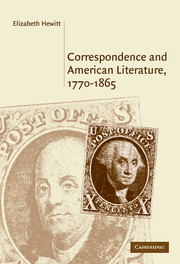3 - Melville's dead letters
Published online by Cambridge University Press: 22 September 2009
Summary
Like Margaret Fuller, Herman Melville interrogates Ralph Waldo Emerson's essay “Friendship.” In The Confidence-Man (1857), he offers a parodic portrayal of Emerson's theories of friendship in the character of Egbert, the “practical disciple” of Mark Winsome, author of “Essay on Friendship.” Like its Emersonian prototype, Winsome's theory of friendship asserts that ideal social relations are with strangers, and it is in these terms that the Thoreauvian Egbert refuses to succumb to the Confidence-Man's appeals to fraternal trust: “I entirely agree with my sublime master, who, in his Essay on Friendship, says so nobly, that if he want a terrestrial convenience, not to his friend celestial (or friend social and intellectual) would he go.” The essence of the transcendentalist friendship, Melville's novel suggests, is misanthropy.
The novel also intimates that the basis of the friendship between Egbert and his philosophical mentor, Winsome, is tyranny. Hence the Confidence-Man accuses Winsome of having “usurp[ed]” Egbert's voice: “It is Mark Winsome that speaks, not [you]” (1062). Egbert responds by asserting his fundamental identity with Mark Winsome:
If so, thank heaven, the voice of Mark Winsome is not alien but congenial to my larynx. If the philosophy of that illustrious teacher find little response among mankind at large, it is less that they do not possess teachable tempers, than because they are so unfortunate as not to have natures predisposed to accord with him.
(HM, 1,062)- Type
- Chapter
- Information
- Correspondence and American Literature, 1770–1865 , pp. 83 - 110Publisher: Cambridge University PressPrint publication year: 2004

